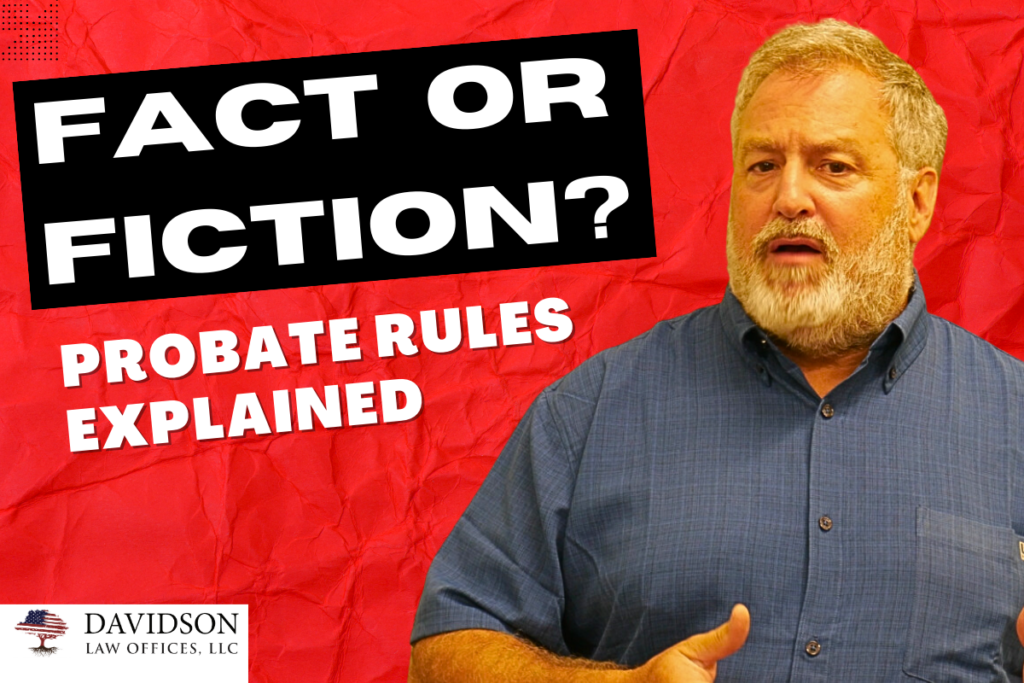Lately we’ve been getting a lot of questions regarding wills and probate. There is a lot of misinformation out there regarding whether or not you have to probate in certain situations. So in this blog we’ll do a little fact or fiction regarding wills, trusts, and in which cases you have to probate.
When Do You Have to Probate?
Fact or Fiction: I’m married and everything will go to my spouse, so I don’t need a will because there’s nothing I’d have to probate.
This is fiction. Everyone needs a will unless you want the government to determine who is going to get your property, how they’ll get your property, when they’ll get your property, and who will be in charge when you’re gone. Now let’s dig a little deeper into this scenario. Let’s say you’re on your second or third marriage and have children from a previous marriage. Everything doesn’t necessarily go to your new spouse if you pass. Here in Georgia, your new spouse would get a third of your assets and your children would split the other two-thirds.
If you have young children and don’t have a will, things get even more complicated. A guardian ad litem would have to be appointed for the children to make sure their rights are protected under the administration. What if you have an estranged child and die without a will? Even though you may not want that estranged child to inherit any of your assets, they would still get a child’s share. In addition to having a will, be sure sure your beneficiary designations are correct on your life insurance policies and retirement accounts.
Fact or Fiction: I have a will which says everything goes to my spouse, so they won’t have to probate.
As an absolute statement, this is fiction. It all depends upon how the assets are titled. Prior to 1986 in Georgia, the rules were different than they are now. If a husband and wife both owned real estate and one died, the presumption was that each spouse owned half. That’s not how it is today. But before 1986, you’d have to probate half of the house to transfer it to the spouse that was still living.
The titling of your assets is extremely important. Make sure your real estate, bank accounts, cars, boats, etc. are all title properly when doing your estate planning. Also be careful with bank accounts. Banks have a tendency to put children on your bank accounts joint with rights of survivorship. This is usually not an issue if you have only one child. But if you have multiple children, this can easily create a dispute between children if only one child was listed on the bank account(s).
Fact or Fiction: I have a trust so I don’t have to probate.
As an absolute statement, this is fiction as well. There are different types of trusts that we have discussed in previous blogs. There are revocable or living trusts, irrevocable trusts, and testamentary trusts that are created inside a will. The testamentary trust doesn’t come into play until you pass, but the other two do.
Now it is true that assets in the trust pass outside of probate. Those assets inside the trust are not subject to the rules and regulations of probate. But again, this goes back to how the assets are titled.
I have some clients in Florida that own property there and another state. They’ve had a trust since 2002, but we recently discovered that none of their real estate was in the trust. If something would have happened to them, that real estate would have been subject to probate in the state where it was owned.
Thankfully, we were able to catch that mistake and get their real estate inside the trust. So yes, a trust can avoid probate. But this is only the case if the trust is funded before you pass, basically meaning you’ve put those assets inside the trust.
Ways Assets Can Be Titled
There are basically four ways that assets can be titled, and we’ll describe each below.
Joint with Rights of Survivorship
In this case, you and your spouse own a house/property and it says “joint with rights of survivorship” after your names. This means that if one of you passes, the other automatically gets the house or property. You don’t have to probate in this case.
Tenancy by the Entirety
This is between a husband and wife only, and is generally applicable for properties in Florida. It works very similarly to joint with rights of survivorship, but it’s specific to properties owned by married couples.
Tenants in Common
In this case, you and your spouse own a house/property and it says “tenants in common” after your names. This means that if one of you passes, the other will have to probate your will in order for the house or property to be transferred into the sole name of the surviving spouse.
Sole Ownership
In this case you own a property outright and your spouses name is not on the deed. If your will says you want your spouse to get the property when you pass, they would have to probate your will get to get that property transferred into their name. If you don’t have a will, then the above mentioned rules would apply. Your spouse would get a third and your children would split the rest.
Contact Us So We Can Help!
If you need assistance with wills, trusts, or any other estate planning needs, complete this form or give us a call at (229) 226-8183. If you’d like to see this blog in video format, you can watch it below. Please be sure to SUBSCRIBE to our YouTube channel and click the bell notification button so that you’re notified each time we publish a new video.

